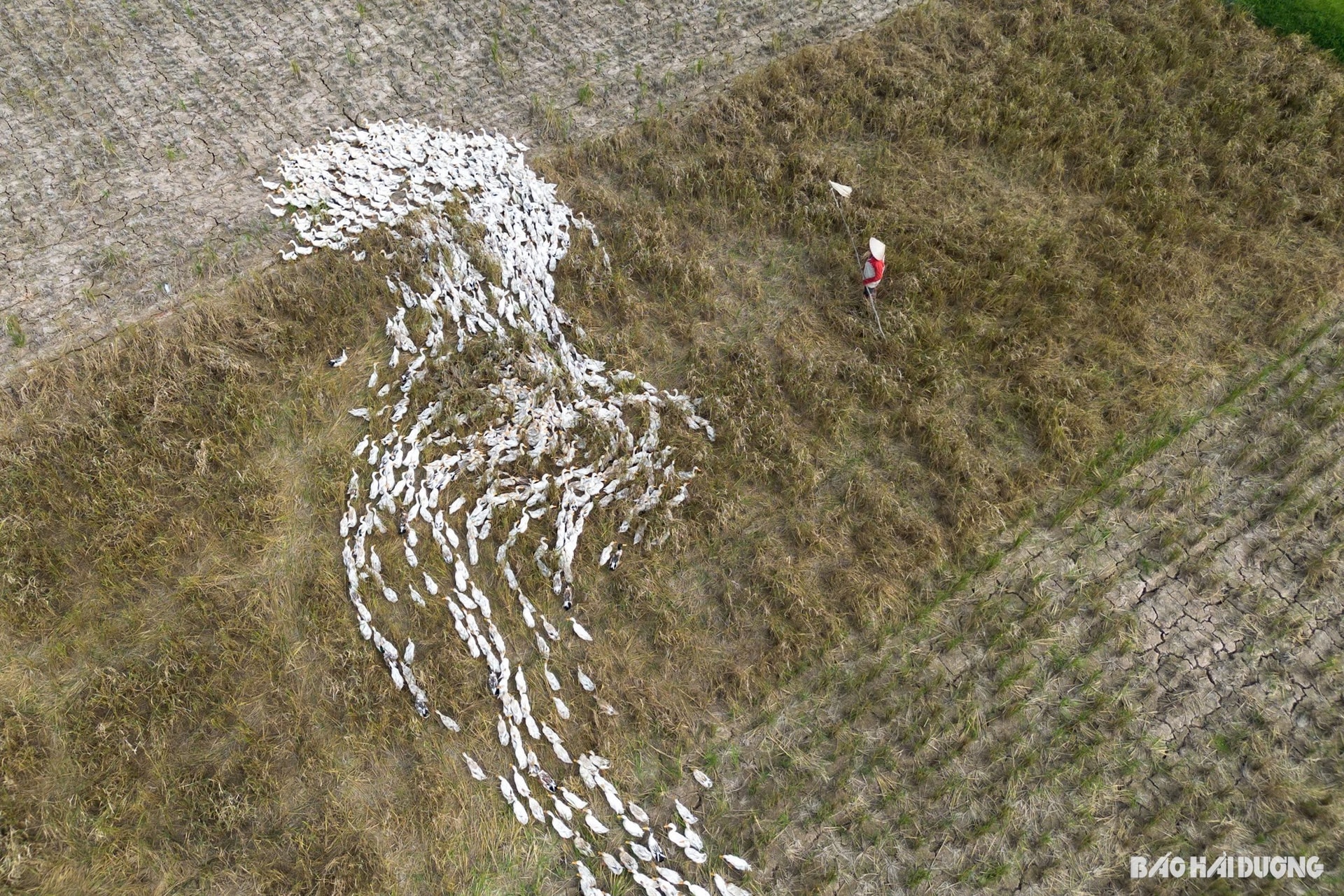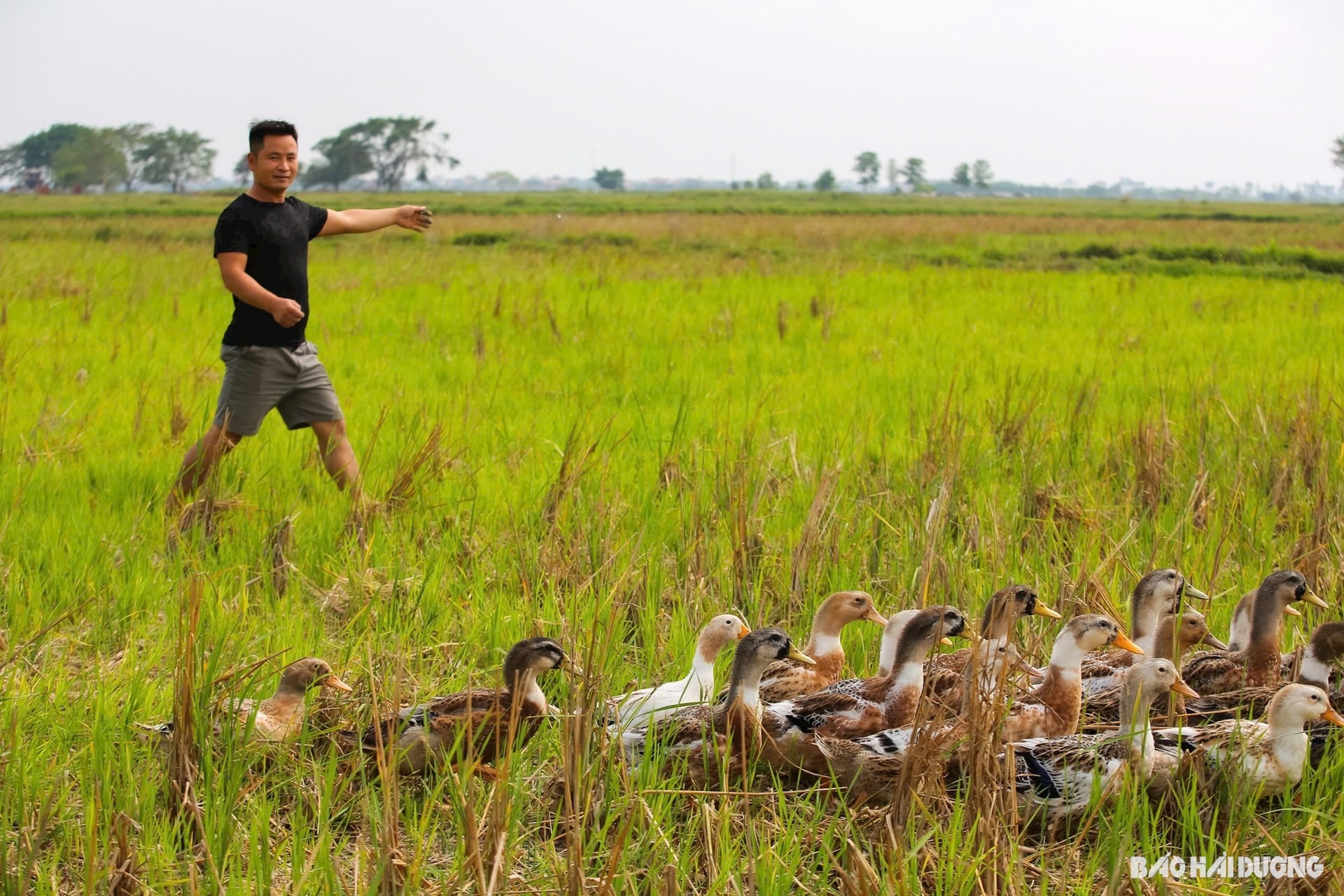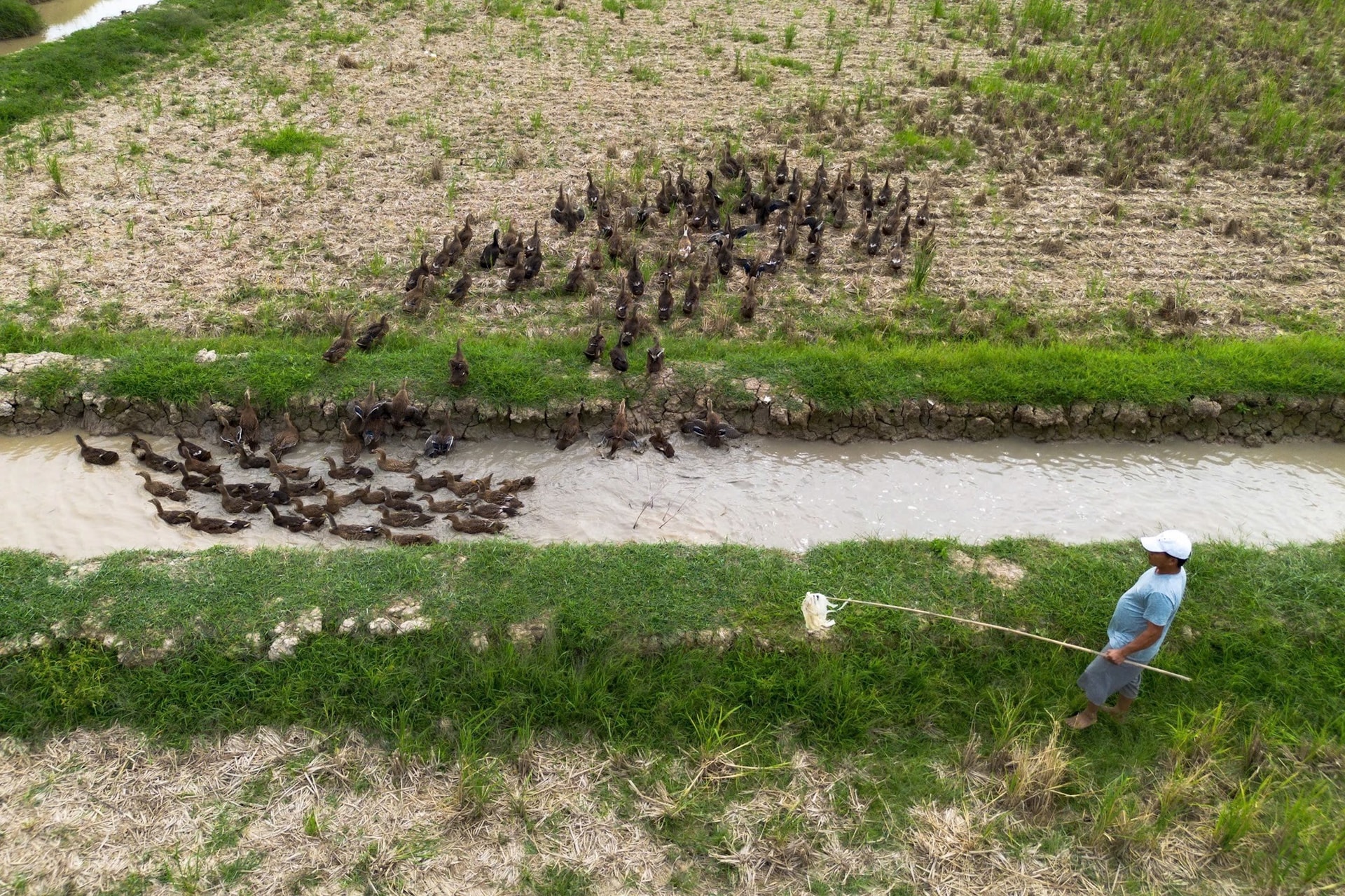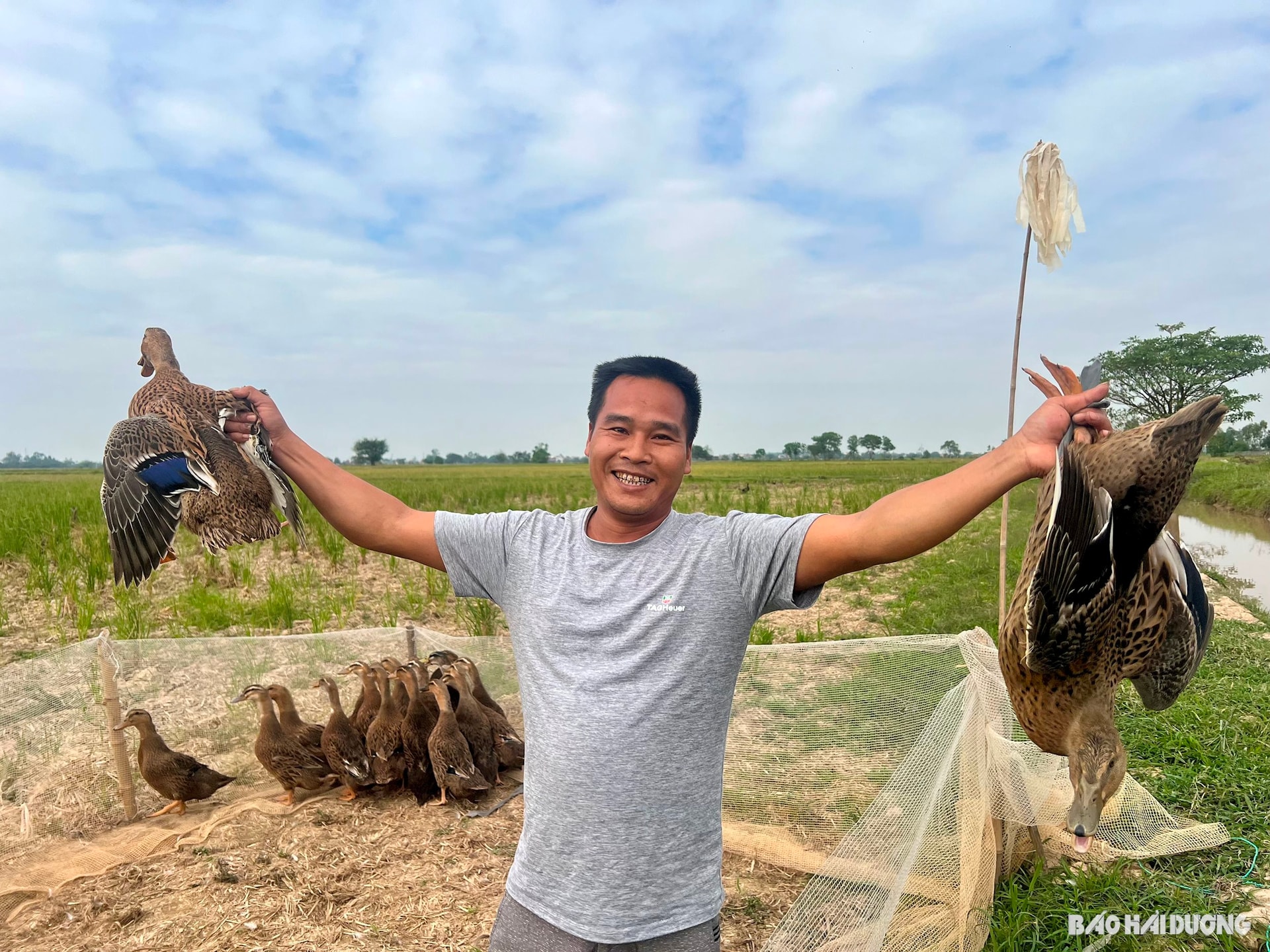When the last rice stalks are harvested, it is also the time for ducks to be released into the fields. Although hard work, this profession is helping many households in Hai Duong have food and savings.

The "nomads" in the plains
On the vast fields of bare stubble, the duck farmers are still diligently doing their work. Regardless of rain or shine, they are like nomads, roaming their flocks of ducks from one field to another.
Having been raising ducks for nearly 10 years, Mr. Pham Cong Vu in Ngo Quyen commune (Thanh Mien) knows every field like the back of his hand. During the harvest season, Mr. Vu takes his ducks there whenever the rice is harvested. For duck farmers, the "white fields, clear water" season is no different from the golden season. Because the ducks are free-range, they take advantage of the opportunity to pick up the scattered grains of rice. Sometimes the ditches are full of snails and algae... Thanks to that, farmers save a lot of costs, and the quality of the ducks is also better.
Mr. Vu said that when the last rice stalks are harvested, it is also the time for ducks to run in the fields. For many years, people have mainly harvested rice by machine, so the rate of rice falling is also higher than when harvesting by hand. For duck farmers, this is a huge source of food, but not everyone can stand the sun and wind, and it is difficult to take the ducks to the fields. Besides, there are thousands of ducks while the stubble is higher than the knees, so it is not easy to look after them.
To avoid loss of ducks, farmers often "wash" the ducks 15-20 days before releasing them into the fields. At this time, the ducks are stronger, know how to forage and are less susceptible to disease. However, free-range ducks will inevitably suffer losses due to straying from the flock. "If we lose many, we will still take the trouble to look for them, but if we lose 1-2, it is considered lost. Because the fields are vast, the ditches are crisscrossed, and the stubble is higher than the knees, so how can we find them?", Mr. Vu shared.

As the afternoon gradually fell, it was also the time for Mr. Tran Van Huyen in Ngo Quyen commune (Thanh Mien) to bring his flock of laying ducks back home. In the hundreds of hectares of fields, there was only him and more than 1,000 laying ducks "slinking" back home. Mr. Huyen was small, wearing a conical hat and holding a long pole, looking like a "beggar" in the middle of the vast fields. Yet he was the owner of a famous farm in the area.
After more than 10 years of hard work, Mr. Huyen has more than 7,000 m² of ponds, fruit gardens and a breeding area for more than 2,000 laying ducks. Because the farm is near the fields, at the end of each harvest season, he takes each batch of ducks out to the fields to release. For laying ducks, the raising time will be twice as long as meat ducks. When it is time to lay eggs, Mr. Huyen will bring the ducks home to raise. Because in the fields, ducks are very susceptible to "flocking" and laying premature eggs. Harvesting eggs and managing laying ducks are also more difficult.
According to Mr. Huyen, herding ducks in the fields is a job of "eating on the side and sleeping in the bushes". It seems like the person is herding ducks, but in fact the ducks are leading the person from one field to another. The hardships of this job can be described all day long. Being exposed to rain and sun, the face and limbs are always covered with mud. Sometimes when it rains, one has to cover oneself with a raincoat and stand in the middle of the deserted field. Because many worries are always lurking around the ducks, if the breeder is negligent, he can lose everything.
The reason is that many places still have the habit of dumping dead animals and pesticide containers into canals and ditches, causing serious water pollution. In addition, ducks raised in fields in harsh weather conditions are also susceptible to disease, so breeders must have a lot of experience to avoid losses. Normally, households will vaccinate ducks against diseases such as fowl cholera, cholera, avian influenza, etc.
"When raised in open fields, ducks will eat a variety of foods, so the risk of disease is relatively high. The most dangerous thing is when a disease breaks out in ducks and can spread quickly to the entire flock, even to ducks of other households. Therefore, we always strictly follow the instructions of veterinary agencies in cleaning, disinfecting and vaccinating poultry flocks," said Mr. Huyen.
"One capital, four profits"

In the past, people often said "If you want to be rich, raise fish, if you want to be well-off, raise pigs, if you want to be poor, raise ducks", but today, when consumers are increasingly concerned about quality and origin, free-range ducks are becoming a clean food source sought after by many traders. In many places, free-range ducks are booked by traders many days in advance to keep their relationship. Thanks to that, free-range duck farming is bringing about the economic efficiency of "one capital, four profits".
According to Mr. Nguyen Van Na in Ung Hoe commune (Ninh Giang), free-range ducks have a growth period of about 60 days, 15-20 days longer than industrial farming. However, with 1,000 industrially raised ducks, each day the farmer will spend over 1 million VND on food. Compared to free-range ducks, this form of farming will cost about 80% more. On the other hand, the process of letting ducks out to the fields also helps reduce environmental treatment costs in the barn. Meanwhile, the fields are supplemented with fertilizer from the ducks.
Mr. Na's family is maintaining a flock of about 500 ducks. Since October, he has hardly spent money on industrial feed because he lets the ducks roam freely. From that savings, his family will have more funds to expand the scale of farming and invest in more modern barns. "Raising free-range ducks often faces many risks such as disease and loss. However, if managed and cared for well, it will certainly not be as expensive as industrial farming. There is even less financial risk because the price of free-range ducks is often higher while the price of animal feed is constantly increasing," said Mr. Na.

In the cool breeze, Mr. Nguyen Ngoc Lam in Thanh Mien district is still working hard in the fields to herd ducks into traps. He said that about 10 days ago, his flock of ducks had more than 1,000, but now they have almost all been sold. In addition to wholesale, Mr. Lam also sells to large restaurants in the district and the province. Because he raises ducks in the fields, he chose to raise the ancient gourami breed. This breed not only has good resistance and is suitable for natural grazing, but also has small bones and soft, fragrant meat.
"Since I let the ducks out to the fields, I have mostly let them roam free. The ducks go out to find food and are exposed to the wind and rain in the fields. Every day, I check the quantity and move the flock closer to home for easier care. Thanks to this completely natural way of raising them, the quality of the duck meat is very delicious and many traders order it. I am selling this type of duck for 50,000 VND/kg. After deducting expenses and losses from this batch of ducks, I can earn about 20 million VND in profit," said Mr. Lam.
According to farmers in Thanh Mien and Ninh Giang districts, free-range ducks are currently being sold for 45,000-50,000 VND/kg, 5,000-10,000 VND/kg higher than industrially raised ducks. With the current selling price, farmers earn about 20,000 VND/kg. In addition, free-range duck eggs cost 2,800-3,000 VND/egg, about 300 VND/egg higher than industrially raised duck eggs.
Mr. Nguyen Van Chien in Hai Duong City, who specializes in purchasing ducks to bring to restaurants, said: "The weather is cold so the demand for ducks is very high, especially free-range ducks. This type is raised naturally so the meat is very delicious and is loved by customers. Currently, many restaurants and eateries only order free-range ducks to roast and make blood pudding. On average, I supply about 300 free-range ducks in the city every day."
According to the Department of Agriculture and Rural Development of Thanh Mien district, the largest duck farming area in the district is concentrated in Ngo Quyen commune. At one point, this locality had a total herd of over 110,000 ducks. Every year, after the end of the crop season, many households often let their ducks roam in the fields. Although it is more difficult, free-range ducks not only have better meat quality but also have higher prices. Because they are favored by consumers, most households that raise free-range ducks do not worry about output. To ensure supply when the free-range duck season ends, many households have raised them according to VietGAP standards. However, currently, the price of ducks raised in this way is not highly competitive compared to industrially raised ducks, causing many households to face many difficulties. They hope that there will be specific policies to support farmers in building and protecting the free-range duck brand.
DO QUYET